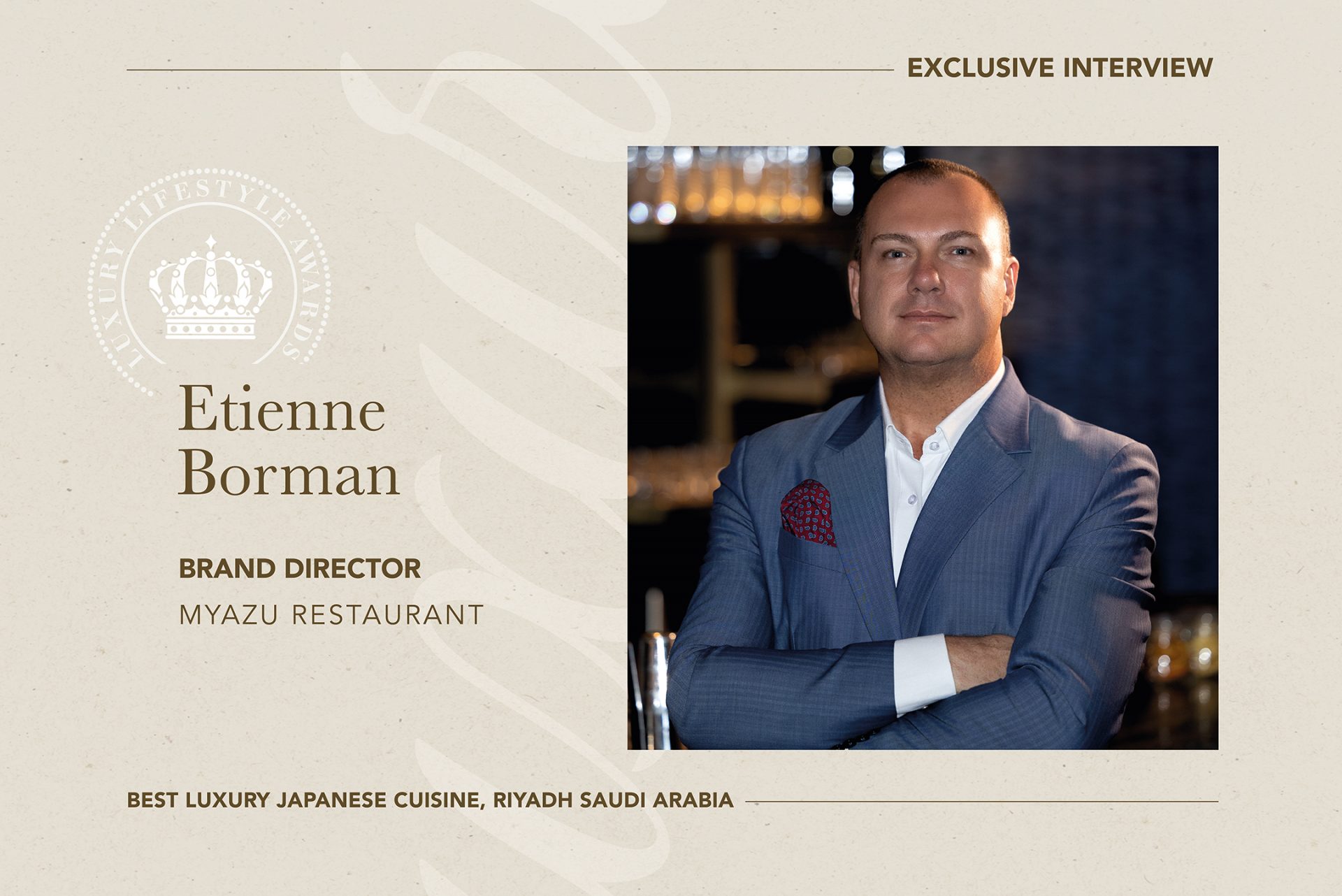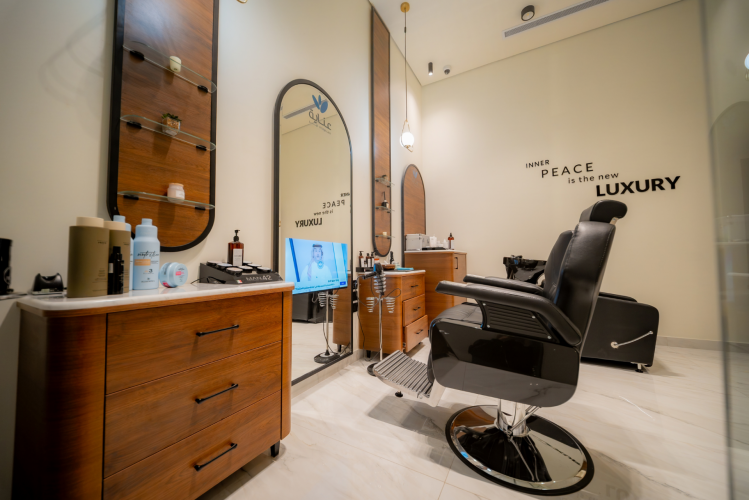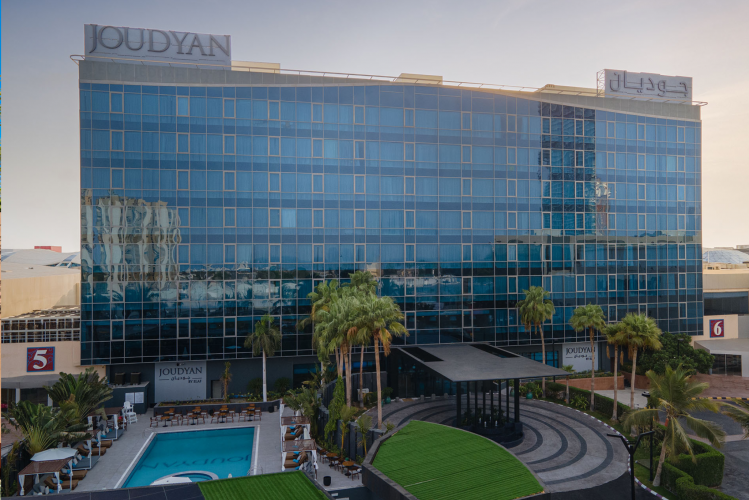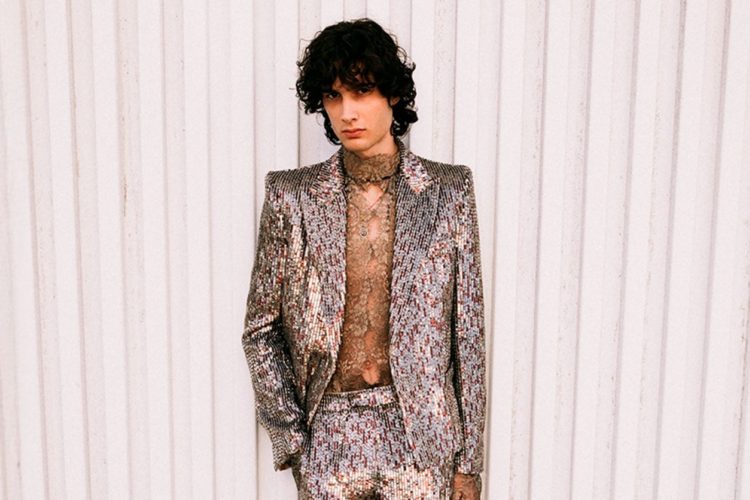In the ever-evolving world of luxury, where excellence is defined by innovation, authenticity, and exclusivity, few names stand out above the rest. Today, we have the privilege of bringing together two industry leaders for an exclusive conversation – Alexander Chetchikov, President of the World Luxury Chamber of Commerce, and Etienne Borman, Brand Director of MYAZU Restaurant, Riyadh’s award-winning destination for Luxury Japanese Cuisine. As MYAZŪ celebrates its recent recognition by Luxury Lifestyle Awards as the Best Luxury Japanese Cuisine in Riyadh, we delve into the broader landscape of luxury, the future of fine dining, and the artistry behind MYAZŪ’s success. Join us as we explore the intersection of tradition and innovation, uncovering the vision that continues to unleash luxury experiences in the culinary world.
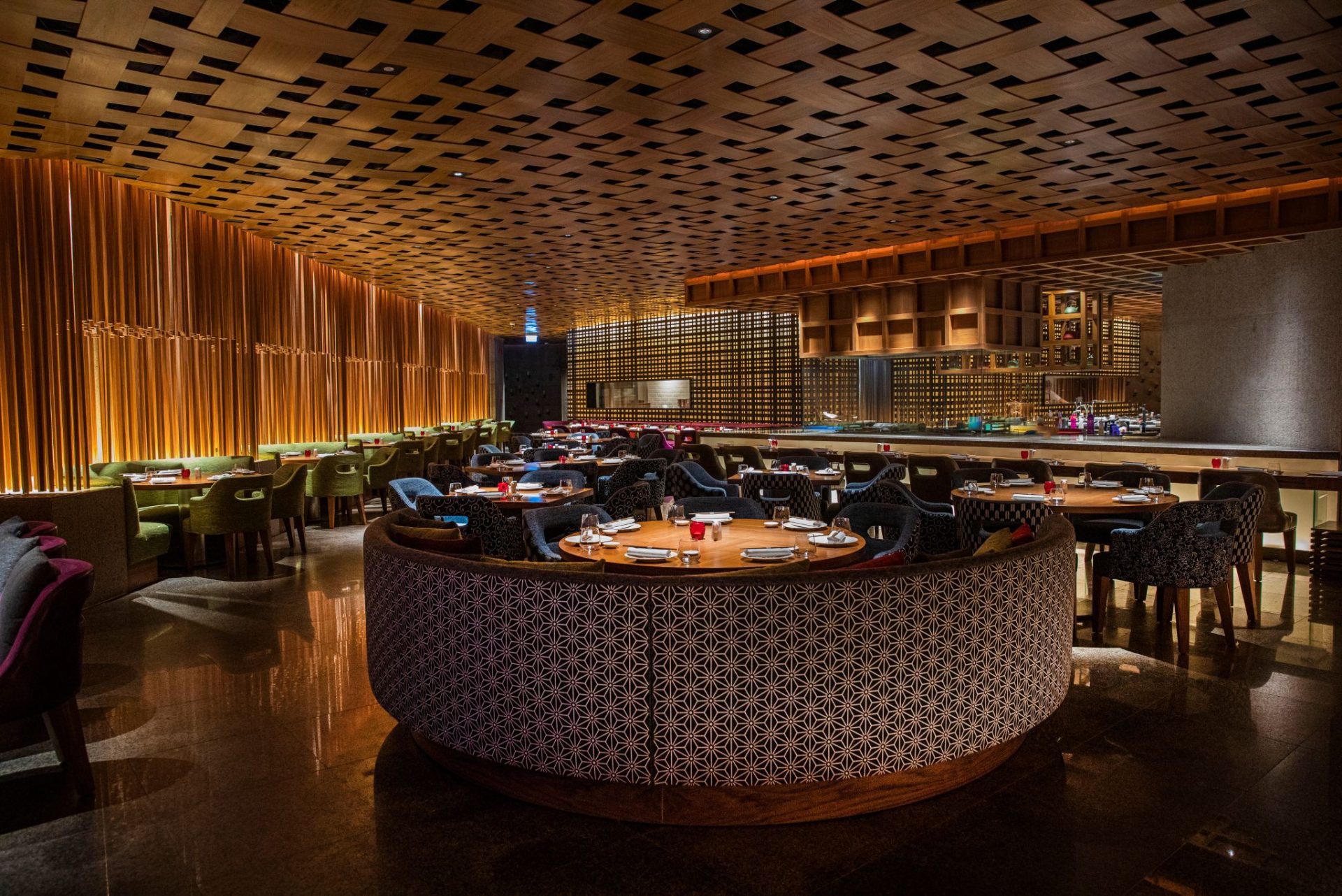
Questions:
Alexander Chetchikov: Luxury is constantly evolving – what does ‘luxury’ mean to you in today’s world, and how has that definition changed over the years?
Etienne Borman: “Luxury” today is no longer just about wealth, exclusivity, or status symbols – it’s increasingly about experience, authenticity, and meaning. In the past, luxury was often defined by material excess: rare goods, designer labels, five-star accommodations, and outward displays of affluence. It was largely about possession and prestige. Now, the definition has broadened. In today’s world, luxury is more personal, mindful, and intentional; the freedom to disconnect, rest, and be present. It’s about quality over quantity, things made with care and with a story. It’s about access to culture, knowledge and experiences that enrich your life.
Luxury has shifted from being about “having more” to “having better.” Many people now seek unique experiences, human connection, and a sense of purpose — things that money alone can’t always buy.
AC: With digital transformation reshaping industries, how do you see technology influencing the luxury dining and hospitality sector? Is there a risk of losing exclusivity in the digital age?
EB: Technology is profoundly reshaping the luxury dining and hospitality industry — but rather than diminishing exclusivity, it’s redefining how it’s expressed. The key is how brands integrate this – when done thoughtfully, technology can enhance the luxury experience rather than dilute it.
Data analytics allow us to remember preferences, predict desires, and tailor experiences with greater precision. Technology is empowering luxury venues to be more environmentally and socially responsible — from blockchain-traced sourcing in fine dining to energy-efficient smart buildings in hospitality. Guests increasingly see this ethical layer as part of true luxury.
Is There a Risk of Losing Exclusivity? Yes, but only if technology is applied generically or without intention.
Technology is not the enemy of exclusivity — thoughtless use of technology is. The future of luxury lies in blending digital sophistication with human intuition to create experiences that feel effortless, elegant, and deeply personal.
AC: The future of luxury is being shaped by shifting consumer preferences. How do you think luxury brands must adapt to meet the expectations of the next generation of high-net-worth individuals?
EB: The next generation of high-net-worth individuals, particularly Millennials and Gen Z, are redefining what luxury means, and brands must evolve accordingly. They are more globally connected, digitally native, socially conscious, and experience-driven than any generation before. They value meaning over materialism and connection over convention.
Luxury brands must shift from being aspirational empires to experiential ecosystems. Those who listen, adapt, and design with empathy for this evolving clientele, while staying true to their essence, will thrive in a luxury landscape that is more personal, purposeful, and digital than ever before.
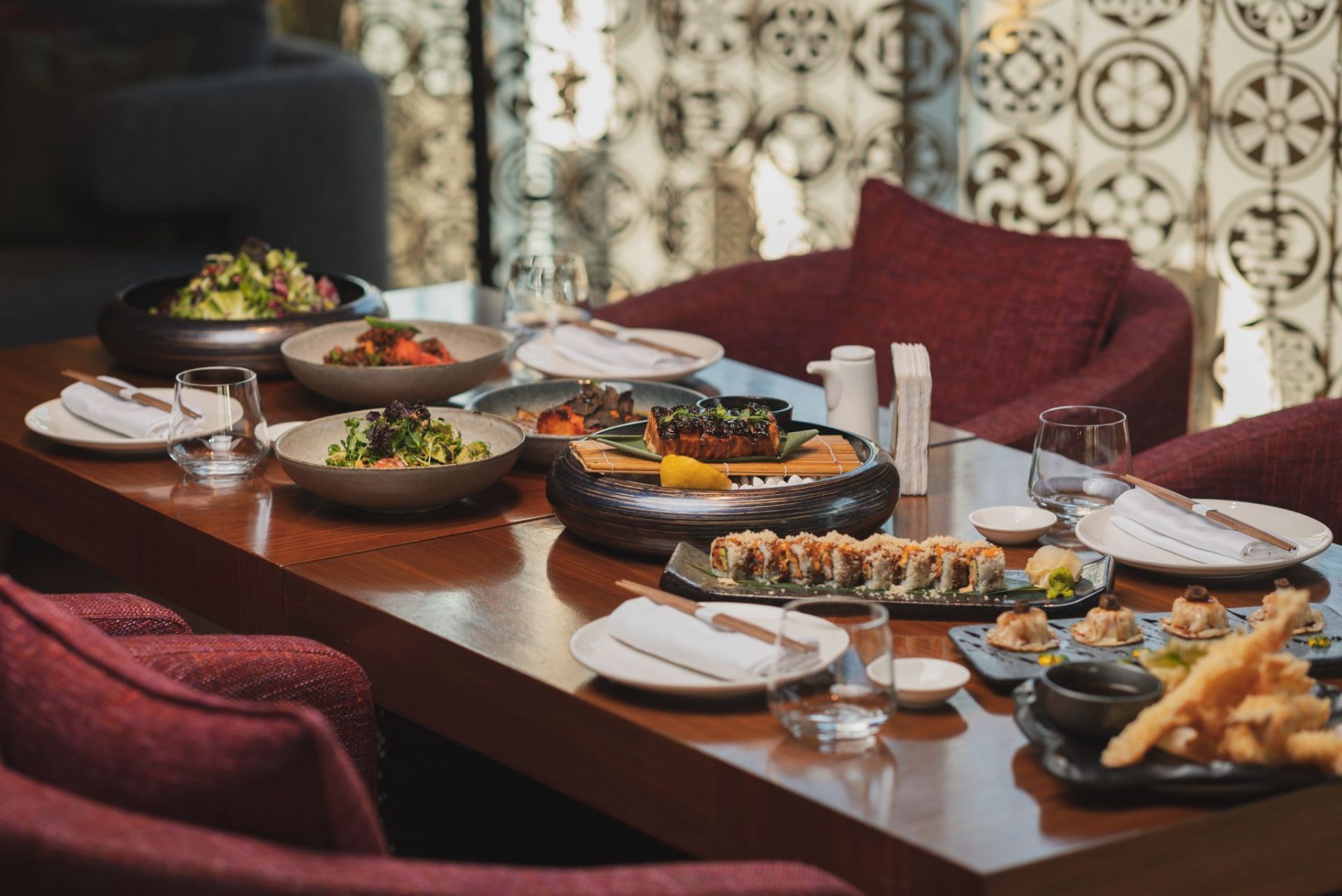
AC: Collaboration is becoming increasingly significant in the luxury sector, whether through cross-industry partnerships or brand alignments. How do you see collaboration redefining luxury experiences today?
EB: Collaboration in the luxury sector has evolved from a marketing tactic to a strategic driver, reshaping what luxury means in a connected, experience-driven world. Today’s affluent consumers, especially younger ones, seek experiences that are unexpected, meaningful, and culturally relevant — and collaboration enables that by blending distinct worlds into something fresh and elevated. At MYAZU, partnerships with brands like Bentley and Rolls-Royce, as well as local artists, create exclusive and culturally resonant moments that go beyond dining. These collaborations foster innovation, scarcity, and storytelling, allowing brands to reach new audiences without compromising identity. The strongest partnerships are not just co-branded — they’re co-created, grounded in shared values like craftsmanship and creativity. In a market where ownership is no longer the pinnacle of luxury, it’s these collaborative, immersive experiences that define what’s truly exceptional.
AC: Sustainability and ethical sourcing are gaining importance even in the luxury market. How can fine dining and the wider luxury sector embrace sustainability without compromising exclusivity and excellence?
EB: Sustainability is becoming the new standard of excellence in luxury, not a compromise to it. In fine dining and across the broader luxury sector, ethical sourcing and eco-conscious practices enhance rather than diminish quality and prestige. By telling the story of ingredients—from heirloom varieties and regenerative farms to single-origin producers—brands can offer deeper authenticity and connection. Menus evolve from listing items like “Wagyu steak” to sharing their origins from carbon-sequestering, humane farms. Luxury today is less about excess and more about essence: focused tasting menus, zero-waste kitchens, and locally foraged ingredients elevate the sensory experience. Sustainability doesn’t dilute luxury—it deepens it, aligning the same attention to detail, quality, and storytelling with conscious creation. The future of luxury lies in how beautifully, responsibly, and meaningfully it’s made.
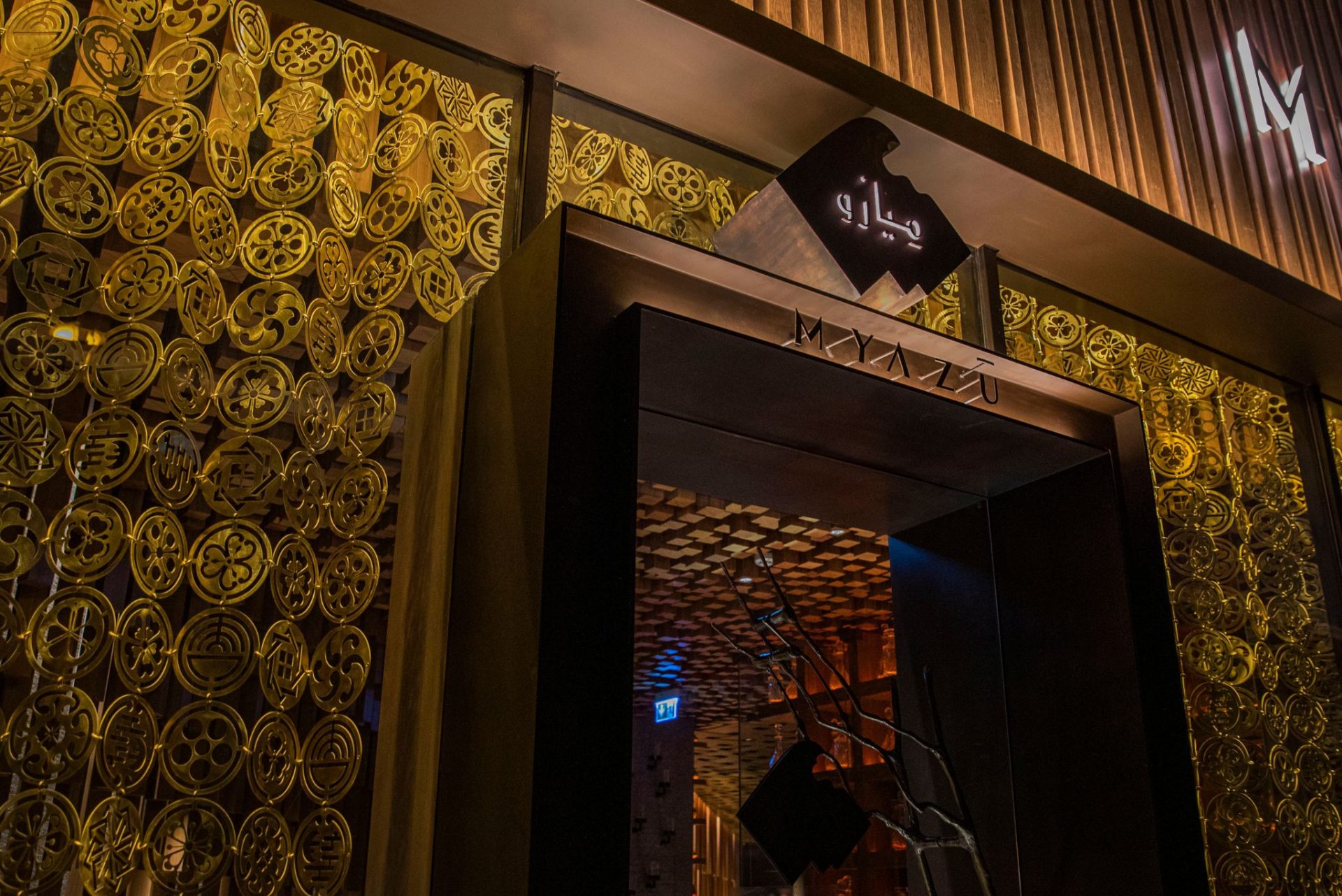
AC: MYAZU has just been awarded Best Luxury Japanese Cuisine in Riyadh – what sets MYAZU apart from other fine dining experiences in the region?
EB: We are proud to celebrate MYAZU’s recognition as Best Luxury Japanese Cuisine in Riyadh — a testament to its role in shaping the region’s fine dining scene. MYAZU reimagines Japanese culinary tradition through a contemporary lens, offering a refined menu that blends umami-rich flavors, modern techniques, and world-class ingredients with artistic presentation. More than a restaurant, it delivers a fully immersive experience, where dramatic, minimalist design meets Saudi sophistication, and service is both intuitive and personal. The atmosphere is carefully curated through lighting, textures, and music, creating a sensory journey that resonates with a well-traveled, experience-driven clientele. MYAZU avoids fleeting trends in favor of timeless luxury rooted in consistency, quality, and emotional connection. As a pioneer in Riyadh’s evolving culinary landscape, it redefines Asian fine dining in the Gulf, bridging cultures through a uniquely Saudi expression of global excellence.
AC: You have successfully blended traditional Japanese culinary artistry with modern innovation. What inspires your approach, and how do you ensure authenticity while introducing contemporary elements?
EB: Thank you, that’s a thoughtful reflection on what we strive to achieve. Our approach at MYAZU is inspired by a deep respect for the precision and philosophy of traditional Japanese cuisine, combined with a desire to create a modern, emotionally resonant experience for today’s global diner — particularly within the vibrant and evolving cultural landscape of Riyadh.
At the heart of our inspiration is washoku — the Japanese approach to food that emphasizes harmony of flavor, seasonality, and presentation. This philosophy grounds everything we do. We view cuisine as an evolving art form. We draw inspiration from contemporary design, global flavors, and emerging culinary techniques, always with the goal of enhancing — never overpowering — the purity of our ingredients.
Being in Riyadh, we’re inspired by the intersection of cultures — our menu is designed to reflect the sophistication and openness of our Saudi guests while staying true to our Japanese roots. This global-local dialogue is at the core of our innovation.
We work with trusted Japanese suppliers for key ingredients like wagyu, uni, miso, and yuzu, while also integrating seasonal and premium local produce to reflect our regional environment in subtle ways.
Innovation doesn’t mean fusion for its own sake. Every modern twist we introduce, whether it’s a unique plating style, a molecular technique, or a flavor contrast — is carefully considered. It must serve the dish’s soul, not distract from it. We ensure our guests understand why a dish is the way it is. Through our service, presentation, and environment, we invite guests into a story, not just a meal. That emotional connection reinforces both authenticity and innovation.
At MYAZU, we don’t see tradition and innovation as opposites, we see them as partners in evolution. By honoring the heritage of Japanese cuisine while staying attuned to the tastes, aesthetics, and expectations of modern diners, we create a space where authenticity is not frozen in time, but brought to life through creativity. That is, and always will be, our guiding inspiration.
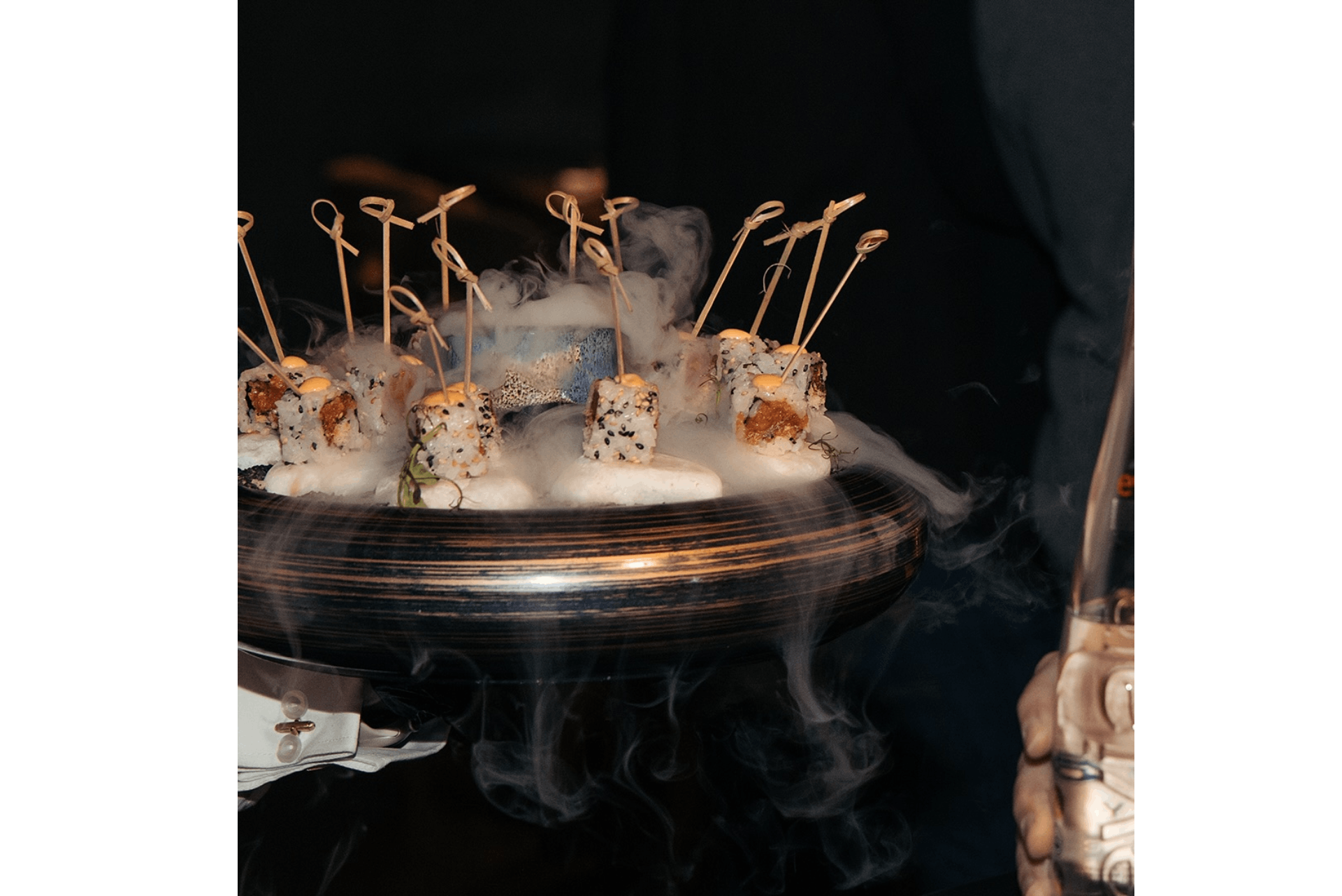
AC: Luxury dining is as much about ambiance as it is about the food. How did the collaboration with Noriyoshi Muramatsu influence the restaurant’s atmosphere, and how does design enhance the MYAZU experience?
EB: Absolutely — in luxury dining, ambiance is inseparable from the culinary experience. It sets the emotional tone, shapes perception, and creates the immersive environment in which the food can truly speak. Our collaboration with Noriyoshi Muramatsu, the renowned designer behind some of the world’s most iconic hospitality spaces, was instrumental in shaping MYAZU’s identity as a sensory and cultural experience, not just a restaurant.
Nori brought with him a deep understanding of Japanese aesthetics and the ability to translate them into contemporary luxury environments. His work with MYAZU blends subtle theatricality with refined restraint, resulting in a space that feels both intimate and elevated, with a balance between minimalism and warmth. His interpretation of Japanese design is not cold or stark — it’s sensorial and layered. Through rich textures, curated lighting, and organic materials, he created an ambiance that feels calm yet alive, inviting guests to slow down and fully engage with their surroundings.
The collaboration with Nori was not about decorating a space — it was about composing an atmosphere that aligns with MYAZU’s culinary identity. His design provides the emotional architecture for the experience we aim to deliver: thoughtful, transcendent, and deeply human, timeless, just like the essence of true luxury.
AC: Managing a luxury restaurant requires precision, creativity, and leadership. What are some of the biggest challenges you’ve faced in your role, and how have you overcome them?
EB: Managing a luxury brand like MYAZU is a continuous balancing act that demands precision, emotional intelligence, and visionary leadership. Behind the polished guest experience is a complex system of people, processes, and high standards. In luxury dining, guests expect both consistency and novelty, so we’ve built strong systems and a culture of team empowerment to deliver both. Talent is crucial, and we invest heavily in attracting, training, and retaining individuals who understand refined service and share our values. As Riyadh’s dining scene evolves, we stay relevant through guest feedback, cultural sensitivity, and a globally inspired yet locally attuned approach. Luxury goes beyond food — it’s about crafting an emotional, detail-rich journey across every touchpoint, from reservation to farewell. The pressures behind the scenes are real, but they fuel our pursuit of seamless excellence. At MYAZU, these challenges aren’t obstacles — they’re the very forces that shape our identity, strengthen our team, and elevate every experience we offer.
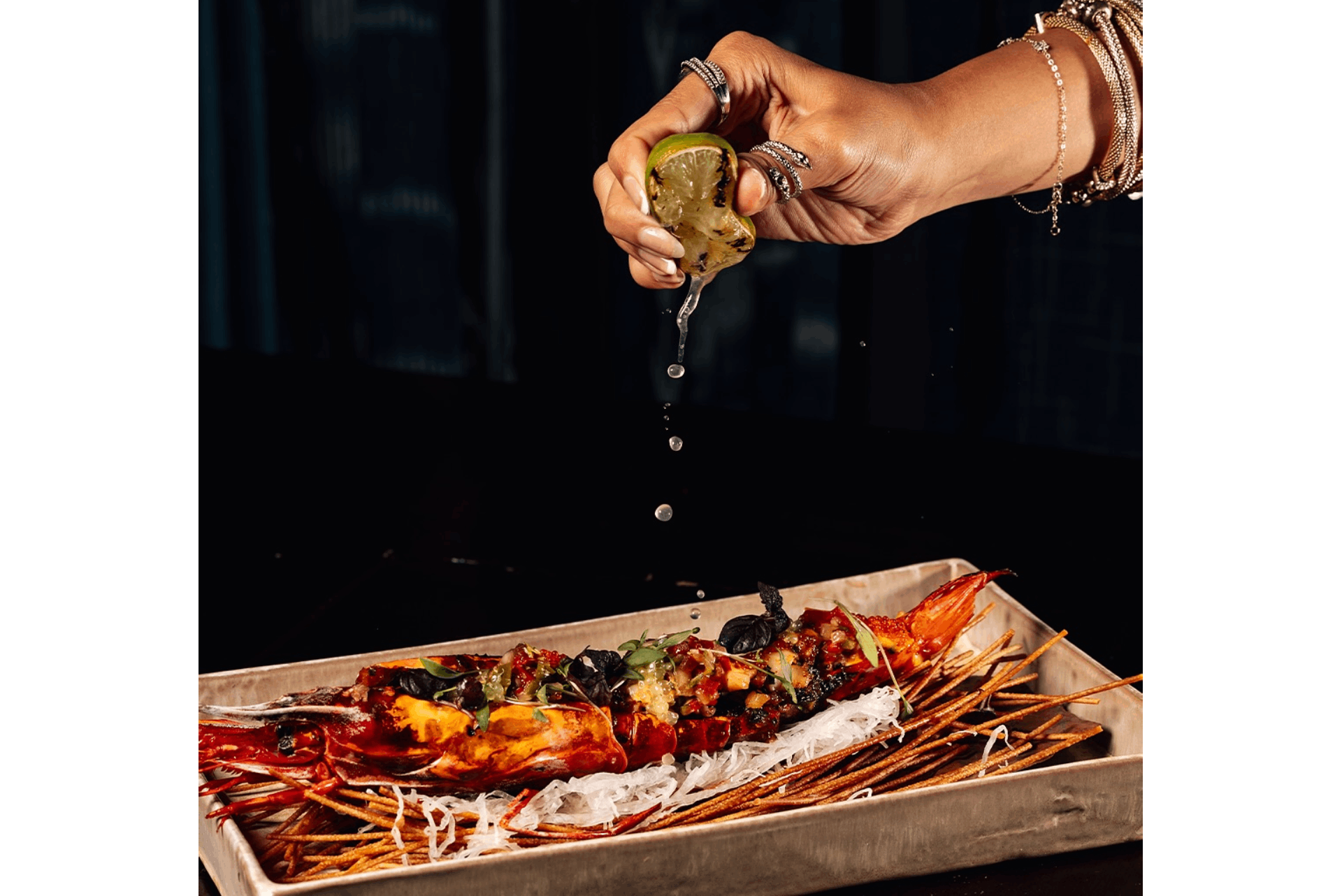
AC: Looking ahead, what’s next for MYAZU? Are there plans for expansion, new experiences, or unique concepts that will continue to elevate the brand?
EB: MYAZU is entering a bold new phase of growth—one defined not just by ambition, but by a commitment to craftsmanship, cultural relevance, and exceptional experiences. Being named Best Luxury Japanese Cuisine in Riyadh is both an honor and a responsibility, driving us to evolve with purpose rather than simply expand. We’re exploring selective growth in key GCC and international markets that value refined, immersive dining, with each new location thoughtfully designed to reflect its local cultural DNA while staying true to the MYAZU ethos. Beyond restaurants, we see potential in curated lifestyle extensions rooted in the same values of refinement and authenticity. To us, true luxury is conscious luxury—and MYAZU aims to lead that conversation in the region, setting a standard for responsible fine dining. This next chapter is about more than growth; it’s about deepening the experience, expanding the story, and reaching new audiences who value meaning as much as mastery. We’re not building a chain—we’re crafting a legacy.

As we conclude this exclusive conversation with Etienne Borman, it’s clear that MYAZU represents more than just a culinary destination; it exemplifies the fusion of tradition, innovation, and luxury in every aspect of its experience. Through Etienne’s insights, we’ve gained a deeper understanding of how the luxury dining industry is evolving, driven by a commitment to sustainability, creativity, and technological advancements. As MYAZU continues to set the standard for luxury Japanese cuisine, we can only anticipate even greater things to come. The future of fine dining, it seems, will be defined by those like Etienne who are dedicated to pushing boundaries while preserving the artistry that makes each experience truly exceptional.



